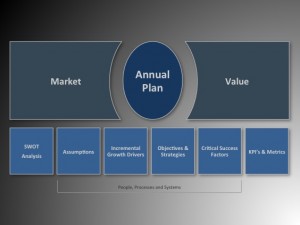It is not possible to overemphasize the importance of the marketing in the annual planning process. This is because annual planning facilitates exceptional financial results while driving transformative improvement – and Marketing can provide the overall roadmap.
Business Planning Versus Annual Planning
At the beginning of each fiscal year, companies have an opportunity to take a step forward, remain in the same place or lose ground to competitors in the marketplace. Companies which tend to stand still or take a step backward do not approach the annual planning process as an opportunity but as a means to simply update the business plan. Instead, they embark upon business planning initiatives which typically result in extensive exercises involving a lot of heavy lifting by large teams of people over massive cycles. Let’s be clear, a sound business plan and business model is required for any successful business. However, the development of an annual plan that is both strategic as well as operationally aligned with the business plan is required to focus, align, run and grow a healthy business.
The Importance of Marketing
To play a key role in the annual planning process, Marketing should design a one-page document which facilitates the process by providing the overall roadmap and plan of action. The annual plan is of utmost importance as it sets the tone and direction for the new fiscal year and that will impact the company’s go-to-market strategy. The annual planning process drives the budget-setting process which will directly impact Marketing. This is because the line item in the budget for marketing programs is usually a significant amount for B2B businesses. A brief, one-page format will force focus on the most important factors for the organization to consider, reveal key insights and develop specific action plans.
Below are the key areas for Marketing to include in an Annual Plan:
- The Market – describe the market and the changes in the market.
- The Value – what are the compelling business problems that will drive action?
Strengths – what are the company’s strengths or core competencies?
- Weaknesses – in what go-to-market areas is the company at a competitive disadvantage?
- Opportunities – what are the potential opportunities not already considered that could positively impact the business?
- Threats – what issues with a high probability of materializing could negatively impact the business?
- Key Assumptions – what are the critical quantitative and qualitative assumptions that the plan rests upon?
- Systems, Process & People – what are the systems, processes and people that need to be addressed to drive growth?
- Objectives – detail all SMART objectives – specific, measurable, attainable, realistic, time-bound.
- Strategies – summarize how objectives will be attained.
- Drivers of Incremental Growth – what will be different in the upcoming year and how will it positively contribute to success?
- Critical Success Factors – what are the key dependencies for the plan to be successful?
- KPIs & Metrics – what are the key metrics and KPIs that must be tracked, monitored and managed to ensure success?
With annual planning, it’s critical to focus on the core issues with the most impact on driving the business forward rather than trying to “boil the ocean.”
Outcome of Solid Annual Planning
The once-a-year annual planning process can be a powerful catalyst for change, and Marketing plays a key role. Incorporating a comprehensive business assessment, establishing an annual planning process, and focusing on a succinct, measurable set of improvement priorities will set an organization up for success.
Download an Annual Plan Template to facilitate the development of an annual plan for your company.
 Strengths – what are the company’s strengths or core competencies?
Strengths – what are the company’s strengths or core competencies?